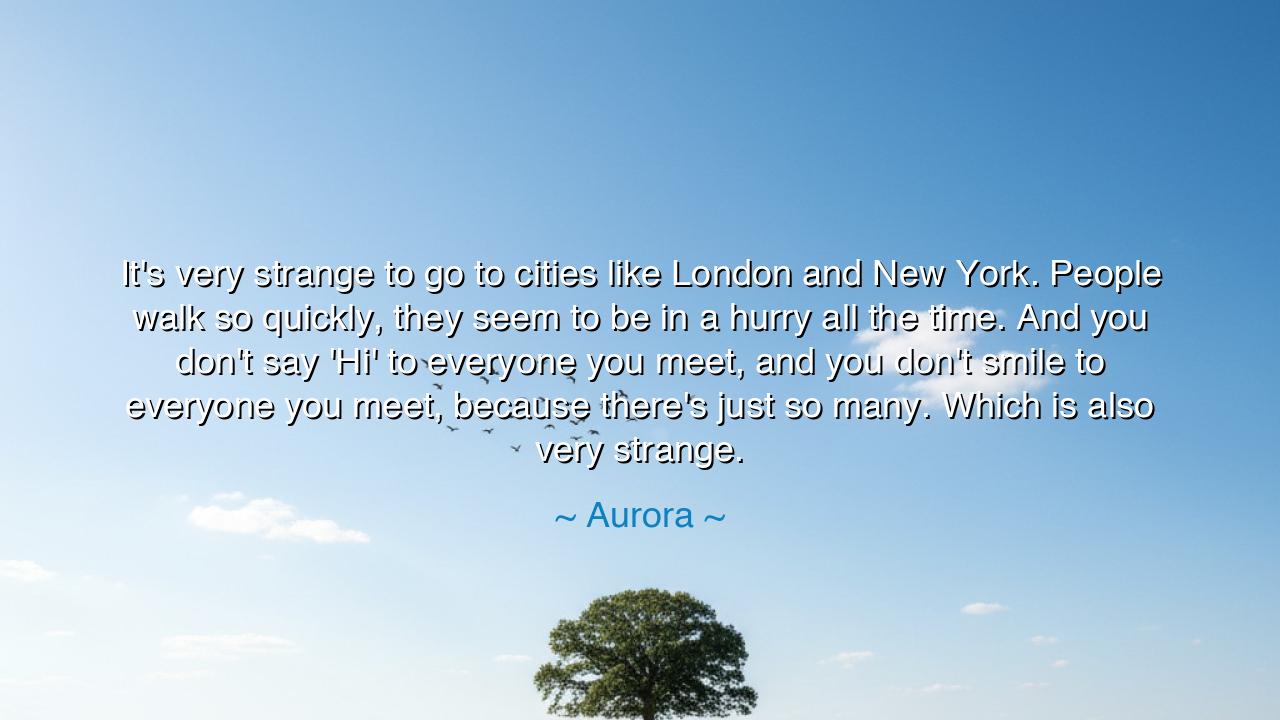
It's very strange to go to cities like London and New York.
It's very strange to go to cities like London and New York. People walk so quickly, they seem to be in a hurry all the time. And you don't say 'Hi' to everyone you meet, and you don't smile to everyone you meet, because there's just so many. Which is also very strange.






Hear, and let your soul reflect upon the words of Aurora: “It’s very strange to go to cities like London and New York. People walk so quickly, they seem to be in a hurry all the time. And you don’t say ‘Hi’ to everyone you meet, and you don’t smile to everyone you meet, because there’s just so many. Which is also very strange.” This utterance is not merely an observation of crowded streets; it is a lament, a song of longing for the lost intimacy between human beings. It speaks to the tension between the vastness of modern cities and the ancient need for connection, for recognition, for the simple exchange of greeting and smile.
In villages and small communities of old, the rhythm of life was slower, and every face was familiar. A man walking the road would pause to greet his neighbor, a woman passing in the market would exchange a smile with every vendor. The greeting was not ritual alone; it was the weaving of invisible threads that bound all souls into one tapestry of belonging. Yet in the immense cities, where multitudes flood the streets like rivers of shadows, this ancient weaving unravels. The sheer number of faces numbs the heart, and so people walk quickly, eyes lowered, as if strangers were not fellow souls but obstacles to be passed.
Consider the tale of Diogenes, the ancient philosopher who wandered Athens with a lamp in daylight, declaring he sought an honest man. What did he mean but this—that in the bustling city, the multitude of faces did not always reflect the presence of connection? Though surrounded by countless others, he felt the loneliness of one who longs for sincerity in a sea of anonymity. Aurora’s words echo this same truth: that the crowd does not always bring closeness, and that abundance of people can sometimes birth the poverty of genuine encounter.
Yet the strangeness Aurora describes is not condemnation but wonder. She marvels at the paradox: that in the places most filled with human beings, one can feel most alone. And in this paradox lies a lesson. For the true wealth of humanity is not measured in numbers, but in bonds of kindness, recognition, and compassion. Without greeting, without smile, the heart starves, even in the midst of millions. This is the danger of the hurried life, where time is valued above presence, and efficiency devours empathy.
But let us not despair, for the remedy lies within reach. One smile, though small, has the power to break the spell of the rushing crowd. One greeting, though fleeting, can awaken another from the sleep of indifference. Even if the multitudes overwhelm us, we can still choose to pause, to lift our eyes, to acknowledge the humanity that surges around us. In doing so, we restore a fragment of the ancient fabric, stitch by stitch, smile by smile.
The lesson, then, is to resist the current of constant hurry. Walk swiftly if you must, but do not let swiftness rob you of connection. Choose, each day, to greet at least one stranger with kindness. Let your smile, even if not offered to all, still be offered to some. Let your spirit remain open, even in a world that teaches closedness. For though you cannot embrace every soul you pass, you can keep your heart from becoming numb to the presence of others.
So let this teaching be carried into the future: Do not let the multitude make you forget the individual. Do not let the crowd make you blind to the person before you. Though the city may rush, though its streets overflow, remember always that behind every passing face is a story, a struggle, and a spark of the divine. Greet when you can, smile when you are able, and slow your steps when the spirit calls. For in these simple acts, you keep alive the ancient song of human connection—a song that even the largest cities cannot silence.






AAdministratorAdministrator
Welcome, honored guests. Please leave a comment, we will respond soon